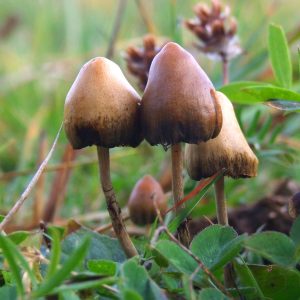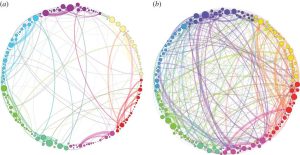8 The Future of Psilocybin in Medicine
Grayson Ellis
Introduction
“Shrooms”, “Caps”, “Alice”, “Magic Mushrooms” – psilocybin, a powerful psychedelic drug, has acquired many names through the years. Psilocybin is the natural psychedelic component found in the psilocybe mushrooms. As discussed in the previous chapter, psilocybin gained popularity in the 1960s and 1970s for its’ mind-opening qualities. Simultaneously, the benefits of psilocybin peaked the interest of scientists, who began early research into the drug. Though the government halted research in the late 1970s, it was not done in vain. This early research set in motion the psilocybin renaissance happening today.

“Psilocybe semilanceata 6514.jpg” by Mushroom Observer is licensed under CC-BY-SA-3.0.
Modern Context
America is facing a mental health crisis that claims the lives of over eight million people a year (HHS, 2023). On top of a staggering death toll, the United States (US) spends an average of $200 billion yearly to treat mental health disorders (HHS, 2023). Both the rate of mental health disorders and subsequent expenditure are increasing still today. Psilocybin, with its mind-altering properties, can provide a solution.
Mental Health Background
New research, focused on psilocybin in the early 2000s, suggests there is real evidence ancient civilizations and 1970s America had it right all along: psilocybin has a place in modern medicine and can help change the lives of those struggling with mental health disorders. Though psilocybin has shown to be effective in treating many mental health disorders, this chapter breaks down psylocibin’s research-based role for two of them: major depressive disorder and bipolar depression.
Major depressive disorder (MDD)
Major depressive disorder (MDD) affects one in ten Americans. MDD causes feelings of sadness that seem to never go away, leaving victims feeling hopeless (HHS, 2023). About a third of MDD cases are so severe that they are treatment resistant, meaning regular medications, such as Sertraline and Bupropion, and therapy no longer make the patient feel better (HHS, 2023).
In any case of MDD, but especially in the case of treatment-resistant depression, mushrooms can be used under the guidance of a doctor to ease depressive symptoms. Research conducted at Johns Hopkins has shown psilocybin to have immediate and long-lasting effects. While regular antidepressants typically require daily doses, only one to two doses of psilocybin a year are needed to treat MDD (Martinez, 2022). Scientists are still unsure of exactly how psilocybin works in the brain, but the results are very consistent: most patients find relief they have not felt through traditional approaches to MDD. While more research should be conducted, it is thought that psilocybin promotes creativity, empathy, and enhances wellbeing (Mason et al., 2018). Other scientists believe that psilocybin enhances spiritual wellbeing, which then can create a direct impact on a person’s quality of life. These new behavior changes create what doctors call a “window of opportunity” where therapy may be received and work better than before (Mason et al., 2018). Regardless, psilocybin grants patients a new perspective, altering their approach to daily living.
Bipolar depression (BPD)

Bipolar depression is a mental health disorder that causes extreme swings in mood. Because of the unpredictable nature of BPD, scientists and healthcare providers have shown caution when exploring the effects of psilocybin in patients with BPD. While the risk of overdosing on psilocybin is low, consumption has the potential to negative psychological issues. This is because psilocybin is “mind manifesting,” meaning that whatever is going on in the patient’s mind is translated and multiplied into their trip.
In any population, there is a risk for a bad trip. When surveyed about experiences using psilocybin, 39% of respondents said that their ‘bad trip’ was in the top 5 most challenging experiences of their lives (Anderson et al., 2019). Regardless of the increased risk for people with BPD, the positive results of psilocybin therapy remain. Those with BPD report improved mood and lessened BPD symptoms (DellaCrosse et al., 2022). Going forward with research specific to BPD and psilocybin, it is critical to ensure the treatment setting is comforting and their mind is in a steady state.
Microdosing
To reduce risks for this group, microdosing may be of interest to patients. Microdosing is when a tiny fraction of a normal dose of psilocybin is taken. This approach means the effects will not be nearly as strong. While there is not really a trip, 92% of microdosing participants in a large-scale study found the same results as a regular, full dose: improved mood and relieved anxiety (Anderson et al., 2019). While some microdosing studies show major, promising results, other studies show more conflicting results: the science is still in progress when it comes to microdosing. Since microdosing is of great interest to researchers now, we can look forward to learning more about its effectiveness and safety in the future.
Conclusion
Psilocybin’s use in mental health care in the future will ultimately be the responsibility of the healthcare provider and whether they want to prescribe it if it receives official, full approval. A study investigating psychotherapists’ openness to psilocybin therapy found that 50% of healthcare providers are unsure of psilocybin’s therapeutic value (Meir, 2022). Ninety percent of these psychotherapists indicated they would recommend other forms of therapy first (Meir, 2022). While these results may not be fully generalizable to all therapists, they demonstrate the importance of education about the benefits of psilocybin. Awareness of the benefits of psilocybin must be raised in the general population, especially within the healthcare community. Though nearly all studies have shown the same results, more research must be conducted to indicate an undeniable magic benefit of the magic mushrooms.
Review Questions
1. True or false: psilocybin therapy for MDD has shown to be effective with longer-lasting impacts than traditional medications.
a. True
b. False
2. True or false: microdosing may help lessen the risk of a “bad trip” for those with Bipolar Disorder.
a. True
b. False
3. Who is ultimately responsible for the implementation of psilocybin in medicine?
a. The government
b. The physician
c. The patient
References
Anderson, T., Petranker, R., Christopher, A., Rosenbaum, D., Weissman, C., Dinh-Williams, L.-A., Hui, K., & Hapke, E. (2019, July 10). Psychedelic microdosing benefits and challenges: An empirical codebook – harm reduction journal. BioMed Central. https://harmreductionjournal.biomedcentral.com/articles/10.1186/s12954-019-0308-4
DellaCrosse, M., Pleet, M., Morton, E., Ashtari, A., Sakai, K., Woolley, J., & Michalak, E. (2022). “A sense of the bigger picture:” a qualitative analysis of follow-up interviews with people with bipolar disorder who self-reported psilocybin use. PLOS ONE, 17(12). https://doi.org/10.1371/journal.pone.0279073
Dorr, A. (2021, December 2). The history of psilocybin: Magic Mushrooms through the ages. Mushroom Revival. https://www.mushroomrevival.com/blogs/blog/the-history-of-psilocybin-magic-mushroom-use-through-the-ages
Martinez, M. (2022, February 16). Psilocybin treatment for major depression effective for up to a year for most patients, study shows. The Hub. https://hub.jhu.edu/2022/02/16/psilocybin-relieves-depression-for-up-to-a-year/
Meir, P., Taylor, L., Soares, J. C., & Meyer, T. D. (2023). Psychotherapists’ openness to engage their patients in psilocybin-assisted therapy for mental health treatment. Journal of Affective Disorders, 323, 748–754. https://doi.org/10.1016/j.jad.2022.12.050
Natasha L. Mason, Elisabeth Mischler, Malin V. Uthaug & Kim P. C. Kuypers (2019) Sub-Acute Effects of Psilocybin on Empathy, Creative Thinking, and Subjective Well-Being. Journal of Psychoactive Drugs, 51:2, 123-134, DOI: 10.1080/02791072.2019.1580804
Pearson, C., Siegel, J., & Gold, J. A. (2022). Psilocybin-assisted psychotherapy for depression: Emerging research on a psychedelic compound with a rich history. Journal of the Neurological Sciences, 434, 120096. https://doi.org/10.1016/j.jns.2021.120096
Ross, S., Bossis, A., Guss, J., Agin-Liebes, G., Malone, T., Cohen, B., Mennenga, S. E., Belser, A., Kalliontzi, K., Babb, J., Su, Z., Corby, P., & Schmidt, B. L. (2016). Rapid and sustained symptom reduction following psilocybin treatment for anxiety and depression in patients with life-threatening cancer: A randomized controlled trial. Journal of Psychopharmacology, 30(12), 1165–1180. https://doi.org/10.1177/0269881116675512
U.S. Department of Health and Human Services. (n.d.). Major depression. National Institute of Mental Health. https://www.nimh.nih.gov/health/statistics/major-depression
U.S. Department of Health and Human Services. (n.d.). Mental illness. National Institute of Mental Health. https://www.nimh.nih.gov/health/statistics/mental-illness
a chemical that can create illusions when consumed
a drug that changes the way people think, see, and feel about things
a mental health disorder characterized by a persistent depressed or sad mood and loss of interest in activities that interfere with daily life
also called bipolar depression, it is a mental disorder characterized by extreme mood swings, typically alternating between episodes of depression and mania
a selective serotonin reuptake inhibitor (SSRI) that restores the balance of serotonin in the brain; commonly prescribed to treat depression, anxiety, PTSD, and OCD
an antidepressant used to treat depression
used to alleviate depression
when a person consumes an amount of a drug that is more than what should be taken at one time, possibly leading to serious health concerns and death
risks include persisting hallucinations, anxiety, and psychosis
the experience someone goes through after consuming psilocybin or other kinds of hallucinogenic drugs
A 'trip' that causes immense anxiety and stress in the consumer
a 'trip' that causes immense anxiety and stress in the consumer
when there is little to no stress and anxiety
taking or administering very small amounts of a drug

